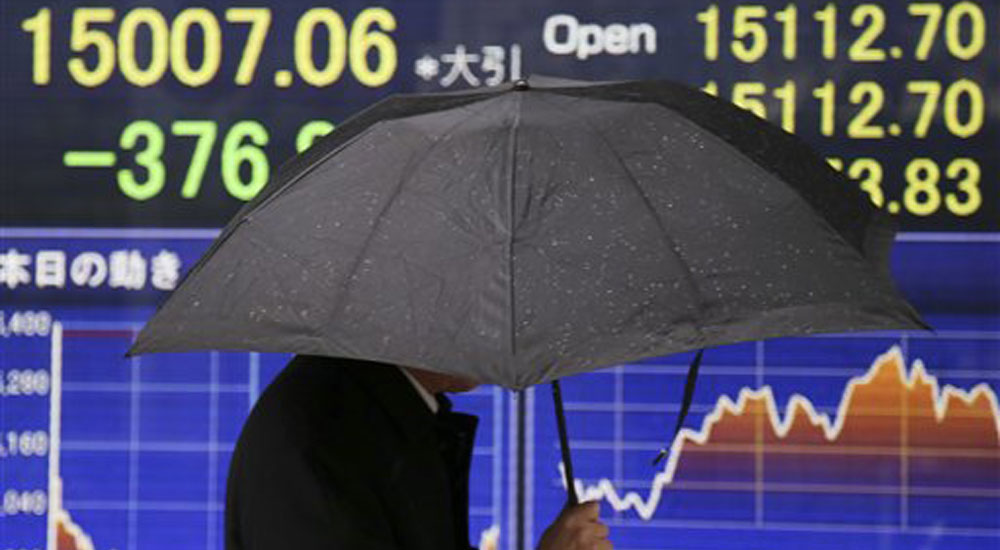
A man walks by an electronic stock board of a securities firm in Tokyo Thursday, Jan. 30, 2014. Asian markets slumped Thursday, extending a global rout on renewed fears about emerging economies after the US Federal Reserve pressed ahead with its stimulus reduction and Turkey and South Africa hiked interest rates. AP
HONG KONG—Asian markets slumped Thursday, extending a global rout on renewed fears about emerging economies after the US Federal Reserve pressed ahead with its stimulus reduction and Turkey and South Africa hiked interest rates.
The dollar and euro sank against the yen as dealers scurried into safer investments after the Fed decision, while sentiment took a further blow from data confirming Chinese manufacturing contracted in January.
Tokyo dived 2.45 percent, or 376.85 points, to close at 15,007.06, leading other markets lower.
Sydney shed 0.78 percent, or 40.9 points, to close at 5,188.1 and Hong Kong lost 0.48 percent, or 106.19 points, to end at 22,035.42 in half-day trading ahead of the Chinese New Year holiday.
Shanghai closed 0.82 percent, or 16.83 points, lower at 2,033.08.
Taipei and Seoul were closed for public holidays.
Wall Street sank Wednesday after the Fed said it would reduce its bond-buying program by $10 billion a month to $65 billion, citing a pick-up in the US economy. That followed a similar announcement in December.
Investors took flight after the announcement, which stoked fears of capital flows from emerging markets that have benefited from the Fed’s cheap money policies, as dealers look for safer investments back home.
In New York the Dow dived 1.15 percent, the S&P 500 1.01 percent and the Nasdaq 1.14 percent. London, Frankfurt and Paris too were all down ahead of the Fed announcement.
Global equity and forex markets have been in turmoil since the end of last week after a plunge in the Argentine peso sparked fresh developing nation fears.
Anxiety about economic growth has been exacerbated by preliminary data from HSBC indicating manufacturing activity in China—the world’s second-biggest economy—had contracted in January.
On Thursday HSBC confirmed its purchasing managers’ index for China had fallen to 49.5, the lowest figure since July.
Rate hikes by Turkey and South Africa Wednesday failed to stem losses in their currencies as developing economies around the world battle against foreigners repatriating their cash.
Russia, Brazil and Argentina also faced further drops in their units, despite the International Monetary Fund stressing there was not a general panic and that each faces specific challenges.
Fed ignores emerging markets
Despite global jitters, Fed policymakers made no mention of emerging markets, leaving investors with little comfort, analysts said.
“The market was discouraged by the fact that they did not refer to emerging economies,” said Hirokazu Kabeya, senior strategist at Daiwa Securities.
In forex trade the dollar and euro edged up against the yen compared from US trading, although down heavily from Asian levels Wednesday. The yen is considered a safe investment in times of trouble.
The dollar made up a little of the ground lost after the Fed announcement, hitting 102.47 yen by late afternoon in Asia, compared with 102.25 yen in New York Wednesday.
The euro also bought 139.57 yen against 139.71 yen and $1.3617 against $1.3662.
Emerging market currencies were also under pressure. Turkey, where political upheaval is fueling market fears, doubled its benchmark rate to 10.0 percent, while South Africa announced a half a percentage point rise.
India lifted rates a modest quarter-point to slow inflation, itself also partly a consequence of the rupee’s slump.
The moves had only a brief impact on the respective currencies.
The Turkish lira jumped about 3.0 percent to 2.17 to the dollar after the rate move, before shedding half those gains. It was sitting at 2.2764 per dollar Thursday.
South Africa’s rand was at a five-year low of 11.38 to the dollar shortly after the rate hike announcement. Although it rebounded later to 11.3094, that was still lower than the pre-rate hike rate.
Indonesia’s rupiah weakened to 12,215 to the dollar compared with 12,160 Wednesday, although the Indian rupee rallied to 62.7010 against 62.4680.
In oil trade New York’s main contract West Texas Intermediate for March delivery gained six cents to $97.42 in afternoon trade while Brent North Sea crude for March was down seven cents at $107.78.
Gold, a safe-haven investment, rose to $1,257.30 at 0810 GMT, compared with $1,254.80 late Wednesday.
In other markets:
— Mumbai fell 0.72 percent, or 149.05 points, to 20,498.25 points.
Shares of the government-owned Bank of India shed 10.47 percent, or 21.80 rupees, to 186.35 rupees a share, while United Spirits fell 6.83 percent or 178.95 rupees to 2,440.50 rupees per share.
— Bangkok lost 0.58 percent, or 7.35 points, to 1,264.07.
Coal producer Banpu fell 2.83 percent to 25.75 baht, while Thai Oil dropped 2.80 percent to 52 baht.
— Jakarta ended up 0.03 percent, or 1.41 points, at 4,418.76.
Asia Pacific Fibers gained 5.43 percent to 97 rupiah, while mobile phone provider Indosat rose 2.17 percent to 4,240 rupiah.
— Wellington fell 0.67 percent, or 32.88 points, to 4,849.84.
Telecom was off 1.7 percent at NZ$2.32 and Fletcher Building was down 0.3 percent at NZ$8.87.
— Kuala Lumpur gained 0.83 percent, or 14.80 points, to 1,804.03.
Utility Tenaga added 5.0 percent to 11.80 ringgit and Petronas Gas rose 1.7 percent to 23.38 but Malaysia Airports Holdings lost 2.2 percent to 8.46 ringgit.
— Singapore fell 0.68 percent, or 20.71 points, to 3,027.22.
Singapore Airlines tumbled 0.83 percent to Sg$9.59 and Singapore Telecom eased 0.28 percent to Sg$3.53.
— Manila slipped 0.47 percent, or 28.65 points, to 6,041.19.
Philippine Long Distance Telephone fell 0.30 percent to 2,698.00 pesos and Metropolitan Bank eased 0.26 percent to 76 pesos but SM Prime Holdings gained 2.24 percent to 15.52 pesos.